“Un pueblo sin memoria es un pueblo sin futuro” read the words inscribed on Chile’s great national stadium – Estadio Nacional Julio Martínez Prádanos; “A people without a memory is a people without a future.”
For the people of Chile, and their beloved football team, it had all been about history. The stadium that had been used by General Augusto Pinochet as a violent prison camp and had then been re-taken by the people – to become a symbol of independence and revolution – had become the stage where Chile would celebrate their grandest sporting triumph. After an exhilarating, adrenaline-filled final that had to be resolved on penalties, Chile had made history.
For the first time in 99 years, Chile had become champions of South America.
The long wait
In 1906, Héctor Rómez, a Uruguayan school teacher and Member of Parliament, organized a kick-about that involved his home nation, Argentina, Brazil and Chile – kicking off a tournament that would soon encapsulate the whole of their continent and capture the world’s imagination.
Three out of the four original contestants had won 86% of all Copas América organized before this one – Uruguay, Argentina and Brazil have won the trophy 15, 14 and 8 times respectively. (On a side note – the three giants have also won a ridiculous nine World Cups between them – 60% of them all).
Chile’s trophy cabinet, on the other hand, had lain as barren as the frigid Atacama that covers its northern regions. Having played slightly more than 750 professional games with a history of a hundred and five years as a national side and 99 years since they first kicked a ball in the Copa América – Chile had won nothing.

Well, not ‘nothing’ in the strictest definition of the term. They had, after all, won plenty of hearts in modern times. Ever since the legendary Argentinian Marcelo Bielsa took over in 2007, Chile have been known for the brand of football that has been named after the great man – “Bielsisime”.
Attacking, fast, direct and imbibed with an intensity that borders on the insane, Bielsisime has seen Chile transform itself from a nation known for producing some great footballing talent (the names Salas, Marcelo and Zamorano, Ivan spring to mind) but lacking any coherent threat as a team, to a nation whose team is now loved by neutrals the world over for their sense of adventure and incredible team spirit.
Yet, they weren’t supposed to win this. The numbers said so. History said so.
Despite Bielsa’s best efforts, they hadn’t even come close to winning the damn thing in years – this edition was their first final appearance in 28 years. Their opponents in the final – Argentina – had lost to them only six times in 85 meetings, and they had never lost to them in the Copa América, ever.
History, though, was no match for “Bielsisime”.
The triumph of the “collective” philosophy of Bielsisime
In the matches before the final, Jorge Sampaoli – a true devotee of Bielsisime if ever there was one – had tempered his team’s game-plan with a pragmatism that had threatened to take the title of neutral’s favourites away from them.
They had been unconvincing in the group stages (though Bolivia may not necessarily agree), with the 3-3 draw against Mexico showcasing them at their topsy-turvy worst. They were also dogged by one controversy after the other.
Sampaoli, the obsessive disciplinarian who had once suspended Charles Aranguiz for oversleeping, turned a blind eye to the drunken antics of Arturo Vidal. The Juventus star was later pilloried for his involvement in the farcical ‘fight’ with Carlos Zambrano prior to the latter’s sending off; and Gonzalo Jara won no friends with his vile actions against Edinson Cavani.
As the final approached, there was a creeping sense that Chile had finally decided that winning necessitated that maybe, just maybe, winning hearts, but not trophies, was simply not good enough. 99 years is, after all, a hell of a long wait.
In arguably the most keenly awaited and high-pressure Copa América final for years (compounding Chile’s title drought, Argentina have been on a run of not having won a trophy in 22 long years), there were very real fears that both teams, especially Chile, would adopt the same safety-first conservatism that afflicts so many national teams.
But thankfully for us idiots clinging to the romantic notion that winning and entertaining are not necessarily separate phenomena, Sampaoli, and Chile with him, eschewed such pragmatic nonsense.
The final (especially the first half) was played at full tilt – the Chileans, little red blurs of whirring feet chasing every ball down, pressuring the Argentinian backline high up the pitch, and quite simply running their more illustrious opponents off the pitch.
Arturo Vidal was everywhere, Mauricio Isla never stopped running down the right wing, Eduardo Vargas kept biting at the heels of the Argentinian defenders and Alexis Sanchez cannoned around the field like an out-of-control ball in a pinball machine.
It would easy to classify Chile’s triumph as the victory of spirit, of determination, of unyielding attitude, and leave it at that. To simplify the win in such a manner, though, would be doing gross injustice to the tactical acumen and sheer levels of footballing skill that the host nation displayed throughout the tournament.
Sampaoli displayed great tactical awareness to adjust his formations according to the opposition. More importantly, he successfully did what his counterpart at Paraguay, Ramón Díaz, couldn’t do – stifle Lionel Messi.
The players were brilliant throughout – their individuality serving to accentuate the Collective, rather than disrupt it. The right wing-back Isla’s wonderful goal against Uruguay was a just reward for his marauding runs down his flank. The striker Vargas’ twin strikes that felled a valiant Peru were magnificent – the winner of the tournament’s golden boot was a threat throughout.
Gary Medel, that thick block of a man seemingly hewn of ice and stone taken from the Andes themselves, was massive as the defensive bedrock of the team. Jorge Valdivia, a wonderfully talented footballer so often a source of frustration due to his temperament, buckled down to finish games with the same intensity he started with – his vision and passing ability helping to unhinge the most obdurate of defences. Claudio Bravo, captain and inspiration, was immense in goal.
Arturo Vidal was a bona-fide force of nature throughout, at his unplayable best more often than not, dragging games by the scruff of their proverbial necks and inspiring results where many could see none.
And then, there was Alexis Sanchez.
If we were to go by the numbers – and in a world obsessed with Opta-esque statistics, that’s not such a strange notion – Sanchez, the standout superstar of the Chilean team, had a poor tournament. No goals, just the sole assist? Pshaw!
But for those who actually watched the games, the influence he had on them was plainly evident. With that inimitable power dribbling style of his, Sanchez carried his nation forward even at the lowest of times – his energy spreading contagiously across the ranks, his skill drawing opponents and creating space for his teammates.
That winning penalty told it all. By all rights it wasn’t textbook Panenka, but he had the cojones to attempt it. And the skill to pull it off. In the end, that’s what matters – not the history, not the numbers, just what you have and what you do with it.
Possessed of courage, inimitable skill, an almost stereotypical never-say-die spirit and the commitment to the “Collective” so fanatically espoused by Bieslisima – and as fun to watch as always – Chile were worthy winners of Copa América 2015.
Epilogue
In a nation mired in political controversy and economic strife, this triumph comes a solace from the Gods. Nothing heals broken dreams, or unites broken countries, quite like football.
For Chilean football, the future is bright. South America has been conquered; the rest of the world will soon be on their radar. If the manner of this victory is any indication, Chile are not going anywhere in a hurry.
Come 2018, they are sure to be prime contenders for the ultimate crown. And quite popular contenders at that.



